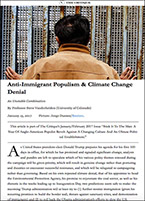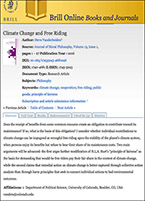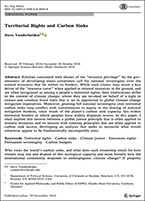How Grammatical Choice Shapes Media Representations of Climate (Un)certainty
by A. Bailey, L. Giangola, and M. T. Boykoff
Media Research on Climate Change, Eds. U. Olausson and P. Berglez, Routledge (2017) |
Elite News Coverage of Climate Change
by M. T. Boykoff and G. Luedecke
Oxford Research Encyclopedia, Climate Science (2016)
 Summary: During the past three decades, elite news media have become influential translators of climate change linking science, policy, and the citizenry. Historical trends in public discourse—shaped in significant part by elite media—demonstrate news media’s critical role in shaping public perception and the level of concern towards climate change. Media representations of climate change and global warming are embedded in social, cultural, political, and economic dimensions that influence individual-level processes such as everyday journalistic practices. Media have a strong influence on policy decision-making, attitudes, perspectives, intentions, and behavioral change, but those connections can be challenging to pinpoint; consequently, examinations of elite news coverage of climate change, particularly in recent decades, have sought to gain a stronger understanding of these complex and dynamic webs of interactions. In so doing, research has more effectively traced how media have taken on varied roles in the climate change debate, from watch dogs to lap dogs to guard dogs in the public sphere. Within these areas of research, psychological aspects of media influence have been relatively underemphasized. However, interdisciplinary and problem-focused research investigations of elite media coverage stand to advance considerations of public awareness, discourse, and engagement. Elite news media critically contribute to public discourse and policy priorities through their “mediating” and interpretative influences. Therefore, a review of examinations of these dynamics illuminate the bridging role of elite news coverage of climate change between formal science and policy, and everyday citizens in the public sphere. Read more... Summary: During the past three decades, elite news media have become influential translators of climate change linking science, policy, and the citizenry. Historical trends in public discourse—shaped in significant part by elite media—demonstrate news media’s critical role in shaping public perception and the level of concern towards climate change. Media representations of climate change and global warming are embedded in social, cultural, political, and economic dimensions that influence individual-level processes such as everyday journalistic practices. Media have a strong influence on policy decision-making, attitudes, perspectives, intentions, and behavioral change, but those connections can be challenging to pinpoint; consequently, examinations of elite news coverage of climate change, particularly in recent decades, have sought to gain a stronger understanding of these complex and dynamic webs of interactions. In so doing, research has more effectively traced how media have taken on varied roles in the climate change debate, from watch dogs to lap dogs to guard dogs in the public sphere. Within these areas of research, psychological aspects of media influence have been relatively underemphasized. However, interdisciplinary and problem-focused research investigations of elite media coverage stand to advance considerations of public awareness, discourse, and engagement. Elite news media critically contribute to public discourse and policy priorities through their “mediating” and interpretative influences. Therefore, a review of examinations of these dynamics illuminate the bridging role of elite news coverage of climate change between formal science and policy, and everyday citizens in the public sphere. Read more...
|
Changing Weather and Climate in Northern Ghana: Comparison of Local Perceptions With Meteorological and Land Cover Data
by K. L. Dickinson, A. J. Monaghan, I. J. Rivera, L. Hu, E. Kanyomse, R. Alirigia, J. Adoctor, R. E. Kaspar, A. R. Oduro, and C. Wiedinmyer
Regional Environmental Change, 1-14 (2016)
 Abstract: Local perspectives on changing weather and climate and analyses of meteorological data represent two different but potentially complementary ways of knowing about the local-scale impacts of global climate change. This paper uses quantitative social survey data from the Kassena and Nankana Districts of Northern Ghana and the best available meteorological records to examine recent changes in weather patterns for this region. The most commonly mentioned changes perceived by respondents include changes in the timing or predictability of rains, and overall drier conditions. Both of these changes are corroborated by precipitation datasets: The onset of the peak rainy season has shifted progressively later over the past decade, by up to a month, and the rainy season has been drier over the past 3–5 years compared to the past 10–35 years, mainly due to lower rainfall during peak months (June and July). Many respondents also said that conditions had become windier, and we find that this perception varies spatially within the districts, but no meteorological data are available for this climate parameter in this region. The common perception that deforestation is responsible for observed changes in weather patterns is partly supported by Landsat imagery indicating a reduction in dense vegetation in recent decades. This comparison highlights some of the potential benefits and challenges involved in giving more voice to community perspectives in the co-production of knowledge on global climate change and its regional impacts. Read more... Abstract: Local perspectives on changing weather and climate and analyses of meteorological data represent two different but potentially complementary ways of knowing about the local-scale impacts of global climate change. This paper uses quantitative social survey data from the Kassena and Nankana Districts of Northern Ghana and the best available meteorological records to examine recent changes in weather patterns for this region. The most commonly mentioned changes perceived by respondents include changes in the timing or predictability of rains, and overall drier conditions. Both of these changes are corroborated by precipitation datasets: The onset of the peak rainy season has shifted progressively later over the past decade, by up to a month, and the rainy season has been drier over the past 3–5 years compared to the past 10–35 years, mainly due to lower rainfall during peak months (June and July). Many respondents also said that conditions had become windier, and we find that this perception varies spatially within the districts, but no meteorological data are available for this climate parameter in this region. The common perception that deforestation is responsible for observed changes in weather patterns is partly supported by Landsat imagery indicating a reduction in dense vegetation in recent decades. This comparison highlights some of the potential benefits and challenges involved in giving more voice to community perspectives in the co-production of knowledge on global climate change and its regional impacts. Read more...
|
Drivers of Adaptation: Responses to Weather- and Climate-Related Hazards in 60 Local Governments in the Intermountain Western U.S.
by L. Dilling, E. Pizzi, J. Berggren, A. Ravikumar, and K. Andersson
Environment and Planning A, 1-21 (2017)
 Abstract: Cities are key sites of action for adaptation to climate change. However, there are a wide variety of responses to hazards at the municipal level. Why do communities take adaptive action in the face of weather- and climate-related risk? We studied what cities are doing in response to existing natural hazards, such as floods, droughts, and blizzards as an analog for understanding the drivers of adaptive behavior toward climate change risks. We conducted a survey of 60 U.S. municipalities followed by six in-depth case studies in the intermountain west states of Colorado, Wyoming and Utah that regularly experience weather and climate extreme events. Our analysis shows that perception of risk and external factors such as planning requirements and availability of funding stand out as important drivers. Nevertheless, political action is rarely driven by a single factor or event. Overall, our results suggest that multiple factors interact or act in combination to produce an enabling environment for action in the face of weather- and climate-related risk. Read more... Abstract: Cities are key sites of action for adaptation to climate change. However, there are a wide variety of responses to hazards at the municipal level. Why do communities take adaptive action in the face of weather- and climate-related risk? We studied what cities are doing in response to existing natural hazards, such as floods, droughts, and blizzards as an analog for understanding the drivers of adaptive behavior toward climate change risks. We conducted a survey of 60 U.S. municipalities followed by six in-depth case studies in the intermountain west states of Colorado, Wyoming and Utah that regularly experience weather and climate extreme events. Our analysis shows that perception of risk and external factors such as planning requirements and availability of funding stand out as important drivers. Nevertheless, political action is rarely driven by a single factor or event. Overall, our results suggest that multiple factors interact or act in combination to produce an enabling environment for action in the face of weather- and climate-related risk. Read more...
|
A Snapshot of Commercial Space, An EU Fellowship Report
by A. González
Center for Science and Technology Policy Research (CSTPR) White Paper 2017-01, 30 pp. (2017)
 Excerpt: Colorado has a vibrant aerospace sector and tightly knit community of dynamic aerospace stakeholders from academia, government and industry, which provides an excellent environment to investigate the subject of this report. The report is based primarily on input gathered through face to face interviews, informal discussions and attendance at several relevant events, from August 15th to December 15th, 2016. In so far as possible, I have tried to identify the sources for specific input reflected in the report. However, this is not always possible as, at times, the same idea has been echoed by several people or it has emerged from one of the numerous informal conversations. There is, of course, a little bit of my own observations and perceptions, as well as a personal attempt at organising the main ideas emerging from my discussions. The final section reflects exclusively my own personal views. Read more... Excerpt: Colorado has a vibrant aerospace sector and tightly knit community of dynamic aerospace stakeholders from academia, government and industry, which provides an excellent environment to investigate the subject of this report. The report is based primarily on input gathered through face to face interviews, informal discussions and attendance at several relevant events, from August 15th to December 15th, 2016. In so far as possible, I have tried to identify the sources for specific input reflected in the report. However, this is not always possible as, at times, the same idea has been echoed by several people or it has emerged from one of the numerous informal conversations. There is, of course, a little bit of my own observations and perceptions, as well as a personal attempt at organising the main ideas emerging from my discussions. The final section reflects exclusively my own personal views. Read more...
|
Anti-Immigrant Populism & Climate Change Denial
by S. Vanderheiden
The Critique (2017)
 Excerpt: As United States president-elect Donald Trump prepares his agenda for his first 100 days in office, for which he has promised and signaled significant change, analysts and pundits are left to speculate which of his various policy themes stressed during the campaign will be given priority, which will result in genuine change rather than posturing and theatrics or encounter successful resistance, and which will be relegated to campaigning rather than governing. Based on his own repeated climate denial, that of his appointee to head the Environmental Protection Agency, his promise to rejuvenate the coal sector, as well as his rhetoric in the weeks leading up to Inauguration Day, two predictions seem safe to make: the incoming Trump administration will at least try to (1) further restrict immigration (given his recurring promises to build the border wall, threats against sanctuary cities, and demonization of immigrants) and (2) to roll back the Obama administration’s efforts to slow the U.S. contribution toward climate change, as well as participate in cooperative international efforts to bring about the same result. Read more... Excerpt: As United States president-elect Donald Trump prepares his agenda for his first 100 days in office, for which he has promised and signaled significant change, analysts and pundits are left to speculate which of his various policy themes stressed during the campaign will be given priority, which will result in genuine change rather than posturing and theatrics or encounter successful resistance, and which will be relegated to campaigning rather than governing. Based on his own repeated climate denial, that of his appointee to head the Environmental Protection Agency, his promise to rejuvenate the coal sector, as well as his rhetoric in the weeks leading up to Inauguration Day, two predictions seem safe to make: the incoming Trump administration will at least try to (1) further restrict immigration (given his recurring promises to build the border wall, threats against sanctuary cities, and demonization of immigrants) and (2) to roll back the Obama administration’s efforts to slow the U.S. contribution toward climate change, as well as participate in cooperative international efforts to bring about the same result. Read more...
|
Climate Change and Free Riding
by S. Vanderheiden
Journal Of Moral Philosophy, 11 (4) 1-27 (2016)
 Abstract: Does the receipt of benefits from some common resource create an obligation to contribute toward its maintenance? If so, what is the basis of this obligation? I consider whether individual contributions to climate change can be impugned as wrongful free riding upon the stability of the planet’s climate system, when persons enjoy its benefits but refuse to bear their share of its maintenance costs. Two main arguments will be advanced: the first urges further modification of H.L.A. Hart’s “principle of fairness” as the basis for demanding that would-be free riders pay their fair share in the context of climate change, while the second claims that remedial action on climate change is better captured through collective action analysis than through harm principles that seek to connect individual actions to bad environmental outcomes. Read more... Abstract: Does the receipt of benefits from some common resource create an obligation to contribute toward its maintenance? If so, what is the basis of this obligation? I consider whether individual contributions to climate change can be impugned as wrongful free riding upon the stability of the planet’s climate system, when persons enjoy its benefits but refuse to bear their share of its maintenance costs. Two main arguments will be advanced: the first urges further modification of H.L.A. Hart’s “principle of fairness” as the basis for demanding that would-be free riders pay their fair share in the context of climate change, while the second claims that remedial action on climate change is better captured through collective action analysis than through harm principles that seek to connect individual actions to bad environmental outcomes. Read more...
|
Territorial Rights and Carbon Sinks
by S. Vanderheiden
Science and Engineering Ethics (2016)
 Abstract: Scholars concerned with abuses of the “resource privilege” by the governments of developing states sometimes call for national sovereignty over the natural resources that lie within its borders. While such claims may resist a key driver of the “resource curse” when applied to mineral resources in the ground, and are often recognized as among a people’s territorial rights, their implications differ in the context of climate change, where they are invoked on behalf of a right to extract and combust fossil fuels that is set in opposition to global climate change mitigation imperatives. Moreover, granting full national sovereignty over territorial carbon sinks may conflict with commitments to equity in the sharing of national mitigation burdens, since much of the planet’s carbon sink capacity lies within territorial borders to which peoples have widely disparate access. In this paper, I shall explore this tension between a global justice principle that is often applied to mineral resources and its tension with contrary principles that are often applied to carbon sink access, developing an analysis that seeks to reconcile what would otherwise appear to be fundamentally incompatible aims. Read more... Abstract: Scholars concerned with abuses of the “resource privilege” by the governments of developing states sometimes call for national sovereignty over the natural resources that lie within its borders. While such claims may resist a key driver of the “resource curse” when applied to mineral resources in the ground, and are often recognized as among a people’s territorial rights, their implications differ in the context of climate change, where they are invoked on behalf of a right to extract and combust fossil fuels that is set in opposition to global climate change mitigation imperatives. Moreover, granting full national sovereignty over territorial carbon sinks may conflict with commitments to equity in the sharing of national mitigation burdens, since much of the planet’s carbon sink capacity lies within territorial borders to which peoples have widely disparate access. In this paper, I shall explore this tension between a global justice principle that is often applied to mineral resources and its tension with contrary principles that are often applied to carbon sink access, developing an analysis that seeks to reconcile what would otherwise appear to be fundamentally incompatible aims. Read more...
|








